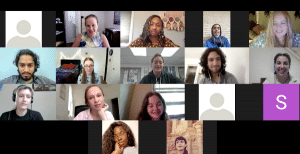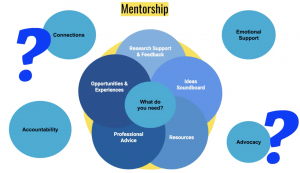
Summer Stipend Cohort Meetings
And just like that, Summer is a wrap and Fall is well underway! But before the first leaves fall, let’s take a look back at what happened during ASOR’s inaugural Summer Stipend program cohort meetings, hosted by Marta Ostovich (ASOR) and Sydney Pickens (ASOR/AITC). The monthly cohort meetings were designed to encourage student connections and promote professional development. Participants from Lebanon to California joined us over the course of the summer to participate in these lively, informative conversations via Zoom:
- Community, Mentorship, and Social Capital. Our first cohort meeting centered around cultivating intentional relationships, both professional and personal. We asked, who are you currently in a community with? We encouraged participants to evaluate their present communities, identify need gaps, and develop a criteria for building relationships that help push them into purpose. We prioritized community over network to encourage genuine, human to human connections that foster more sustainable relationships. This is particularly relevant for the fields of Anthropology and Archaeology, where the work is first and foremost situated within the human experience.
- Self Advocacy. Our second gathering featured a discussion on finding, making space for, and using your voice in academia. The conversation focused on two phenomena particularly prominent among women and people of color: imposter syndrome and code switching. Imposter syndrome causes people to question their abilities, instilling a fear that they will be exposed as a fraud. Code switching is a strategic shift between language and/or vernacular to communicate more effectively with a given audience. However, the switch is often unidirectional and perpetuates a culture of assimilation to dominant power structures. We explored how these phenomena are fueled and perpetuated by systemic bias, and discussed how more inclusive practices and supportive academic environments can reduce their prevalence. Throughout the conversation, facilitators and participants exchanged tips and tricks for showing up in academia (and elsewhere) both authentically and confidently.
- Academia Reimagined/Alternative Futures. Our third meeting featured a panel of speakers who shared their experiences and advice on the academic world: Sarah Kielt Costello (University of Houston-Clear Lake), Jay Crisostomo (University of Michigan), Kate Sheeler (Cathedral High School), and Julia Troche (Missouri State University). Many of the Summer Stipend cohort members are interested in pursuing futures in education and all of our guests work in education, though in a variety of settings. They spoke about the experiences that shaped their careers/career paths: from graduate school to navigating the job market. We discussed what an alternative future in archaeology looks like, how to balance research and professional goals with personal well-being, and how the culture of academia is changing.
- Future Fieldwork. For this meeting, our cohort group was joined by Debra Foran (Wilfrid Laurier University), Rachel Hallotte (SUNY-Purchase), Morag Kersel (DePaul University), and Tom Roby (Getty Conservation Institute) for a conversation on the ins and outs of archaeological fieldwork. This was an interesting conversation since fieldwork has been on hold due to the COVID-19 pandemic, and the Summer Stipend program was focused on non-fieldwork research. This pause in fieldwork offers time to reflect and be thoughtful about getting (or staying) involved with projects in the future. Our guest speakers offered perspectives from their own field projects and experiences, and the cohort students shared what they were looking for in fieldwork. Through this exchange, we identified important considerations for deciding what projects to join. Topics ranged from the professional (how to pick your first field project, how to stay involved long-term with a project, skills that you can gain from fieldwork, etc.) to the very practical (level of support, physical/mental effort required, school credit, project infrastructure, cost, living situations, etc.).
A huge thank you to all of our guest speakers who joined us for these meetings to share their experiences and chat with the cohort!
As part of their Summer Stipends, each cohort member submitted a report on their research and the first report is now available on the ASOR website. Read Shannon Burton’s report on preparing photographs for exhibits in a planned Community Heritage Center in El-Kurru, Sudan here. Stay tuned for more reports from our Summer Stipend recipients on their research in News@ASOR this fall!
To close out the Summer Stipend program, students are being paired with an ASOR mentor. The goal is to give students a chance to connect with someone in their field who can encourage, support, and guide them along their career paths, and/or provide advice in a specific area (publishing, applying to grad school, etc.). Mentoring is also a major part of ASOR’s Diversity, Equity, and Inclusion initiatives. If you’re interested in mentoring students, please take a moment to fill out our mentor survey. Thank you to everyone who has already signed up to be a mentor! You’ll be hearing from us with more information about the mentorship program in the upcoming weeks.


